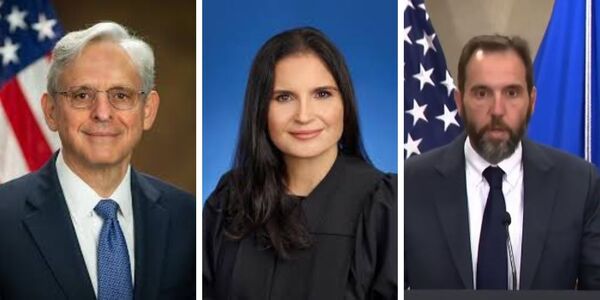Eric Thompson Show Podcast
US District Judge Aileen Cannon has raised important questions about the involvement of Attorney General Merrick Garland in overseeing the case of former President Donald Trump’s classified documents, led by Special Counsel Jack Smith.
During a recent session, Judge Cannon’s inquiries seemed to surprise Smith’s prosecutors as they struggled to provide detailed information about the level of communication between Garland and the special counsel.
The judge’s line of questioning occurred after a lengthy five-hour hearing where Trump’s legal team argued for the dismissal of charges.
They contended that Smith’s appointment by Garland was unconstitutional, claiming that only an officer appointed by the president and confirmed by the Senate should have the authority to prosecute the case.
Judge Cannon appeared focused on clarifying the extent of Smith’s independent authority and sought to understand how his appointment aligned with Justice Department rules and regulations.
Trump attorney Emil Bove referenced Garland’s previous statements about there being “no coordination” between him and the special counsel, particularly in relation to another criminal case against Trump involving allegations of attempting to overturn the 2020 election.
The defense team highlighted this apparent lack of coordination as they attempted to challenge Smith’s authority.
Smith’s deputy, James Pearce, faced difficulty when questioned about communication between Garland and the special counsel.
He stated that he was “not authorized” to discuss specifics, leading Judge Cannon to press for more information.
Pearce emphasized that Smith’s actions were “in compliance” with longstanding Justice Department rules and regulations but struggled to provide concrete details about Garland’s involvement.
The hearing on Friday was just the beginning of a three-day sequence, with further focus expected on Monday regarding claims by Trump’s team that Smith is being improperly funded by the Justice Department.
This ongoing legal battle highlights not only the complexity of Trump’s case but also raises questions about potential conflicts within the Justice Department regarding its handling of high-profile cases.
Cannon, who was randomly assigned to preside over Trump’s classified documents case last June, is a 2020 Trump appointee. Despite her background, she has not given a clear indication of how she intends to rule in this complex and politically charged case.
The intricacies and complexities surrounding this case reflect broader tensions within American politics and judicial processes.
The involvement of high-level officials such as Attorney General Merrick Garland underscores how legal matters intersect with political considerations at every level within government institutions.
These dynamics add layers of complexity to an already contentious legal battle involving a former president.
As this legal saga unfolds over multiple days, it remains unclear how Judge Cannon will ultimately rule on various aspects raised during these hearings.
The implications could extend beyond this specific case, impacting future investigations and prosecutions involving high-profile political figures.
The public scrutiny surrounding these proceedings highlights both public interest in upholding legal standards and concerns about potential political interference in judicial processes.
In conclusion, US District Judge Aileen Cannon’s probing questions into Attorney General Merrick Garland’s involvement in overseeing former President Donald Trump’s classified documents case shed light on broader issues related to judicial independence, executive authority, and political influences within high-profile legal proceedings.
These hearings serve as a reminder that even after leaving office, former presidents remain subject to intense scrutiny through legal channels—a testament to America’s commitment to upholding accountability regardless of one’s position or prominence in society.

